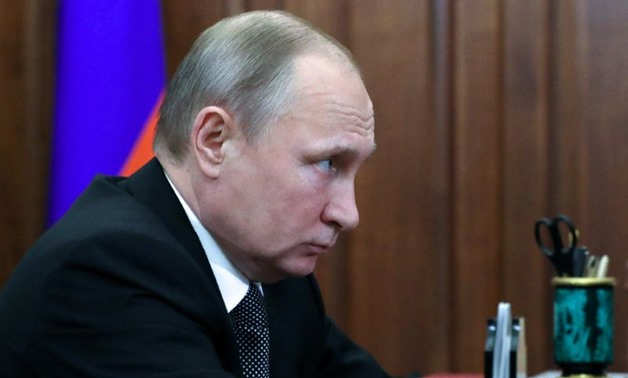
Russian President Vladimir Putin has urged 'common sense' to prevail in the spy poisoning crisis
MOSCOW - 5 April 2018: Russia lost a bid Wednesday at the global chemical weapons watchdog to launch a joint probe with Britain into the spy poisoning scandal, and sought to press its case at the highest level calling for urgent UN Security Council talks.
London has said it is "highly likely" Moscow was behind the March 4 attack on former Russian double agent, Sergei Skripal and his daughter Yulia.
But the Kremlin has vehemently denied any involvement in the poisoning which Britain says was carried out with a military-grade nerve agent developed by the Soviet Union.
With relations between Moscow and the West plummeting to new lows and more than 150 diplomats expelled on both sides, Russian President Vladimir Putin Wednesday called for "common sense" to prevail.
Taking to the international stage, Moscow convened a meeting of the Organisation for the Prohibition of Chemical Weapons (OPCW), calling for a joint Russian-British probe to be set up into the attack.
"Unfortunately, we haven't been able to have two-thirds of the votes in support of that decision. A qualified majority was needed," Russian ambassador Alexander Shulgin told reporters late Wednesday.
"The proposal was about a double investigation led by Russia and the UK. The general director of the OPCW should be the mediator," he elaborated.
But London slammed the idea as "perverse".
"We will not agree to Russia's demand to conduct a joint investigation into the attack in Salisbury because the UK –- supported by many other countries -– has assessed that it is highly likely that the Russian state is responsible for this attack," British chemical arms expert John Foggo told the OPCW's governing executive council.
- Obscuring the truth -
OPCW experts have already taken on-site samples which are being analysed in The Hague, as well as in four other certified laboratories. The head of the OPCW, Ahmet Uzumcu, said he expected the results "by early next week."
Diplomatic sources told AFP that six countries voted in favour of the Russian draft motion, 15 were against with 17 abstentions, mainly countries from the Non-Aligned Movement(NAM).
Britain hailed the result. "The purpose of Russia's ludicrous proposal at The Hague was clear – to undermine the independent, impartial work of the international chemical weapons watchdog," said Foreign Secretary Boris Johnson.
Moscow's main goal was "to obscure the truth and confuse the public," he added.
Bulgaria's ambassador, speaking on behalf of the European Union, said the EU had "full confidence in the UK investigation".
Ambassador Krassimir Kostov said the EU agreed with the British "assessment that it is highly likely that the Russian Federation is responsible and that there is no plausible alternative explanation."
Moscow meanwhile called for a UN Security Council meeting on Thursday at 1900 GMT in New York.
Russian foreign intelligence chief Sergei Naryshkin warned Wednesday in a speech in Moscow that both sides must avoid tensions escalating to the dangerous levels of the Cold War.
Accusations of Moscow engineering the attack were a "grotesque provocation ... crudely concocted by the British and American security services," he said.
- New Cold War? -
Britain's Foggo told the OPCW meeting that Russia was dodging all of London's questions, and had made a series of "shameless, preposterous" statements.
"Russia's refusal to accept the results of the OPCW's investigation unless Russian experts participate in it suggests that Russia is .... nervous about what the results will show," he said.
But in a move hailed as a vindication by Moscow, the British defence laboratory at Porton Down analysing the nerve agent revealed Tuesday that it could not say whether the substance came from Russia.
Refusing to be drawn on whether Russia would accept the OPCW experts results, Shulgin added that any investigation must be based on "100 percent solid facts" and "published publicly."
Russia has accused the West of wanting to put up a new Iron Curtain and warned of a return to the mutual isolation of the Cold War.
For Washington, "fighting the non-existent so-called Russian threat has become a real fixation," foreign intelligence chief Naryshkin said.
"It has reached such proportions and developed such ludicrous characteristics, that it's time to talk about the return of the grim times of the Cold War."

Comments
Leave a Comment